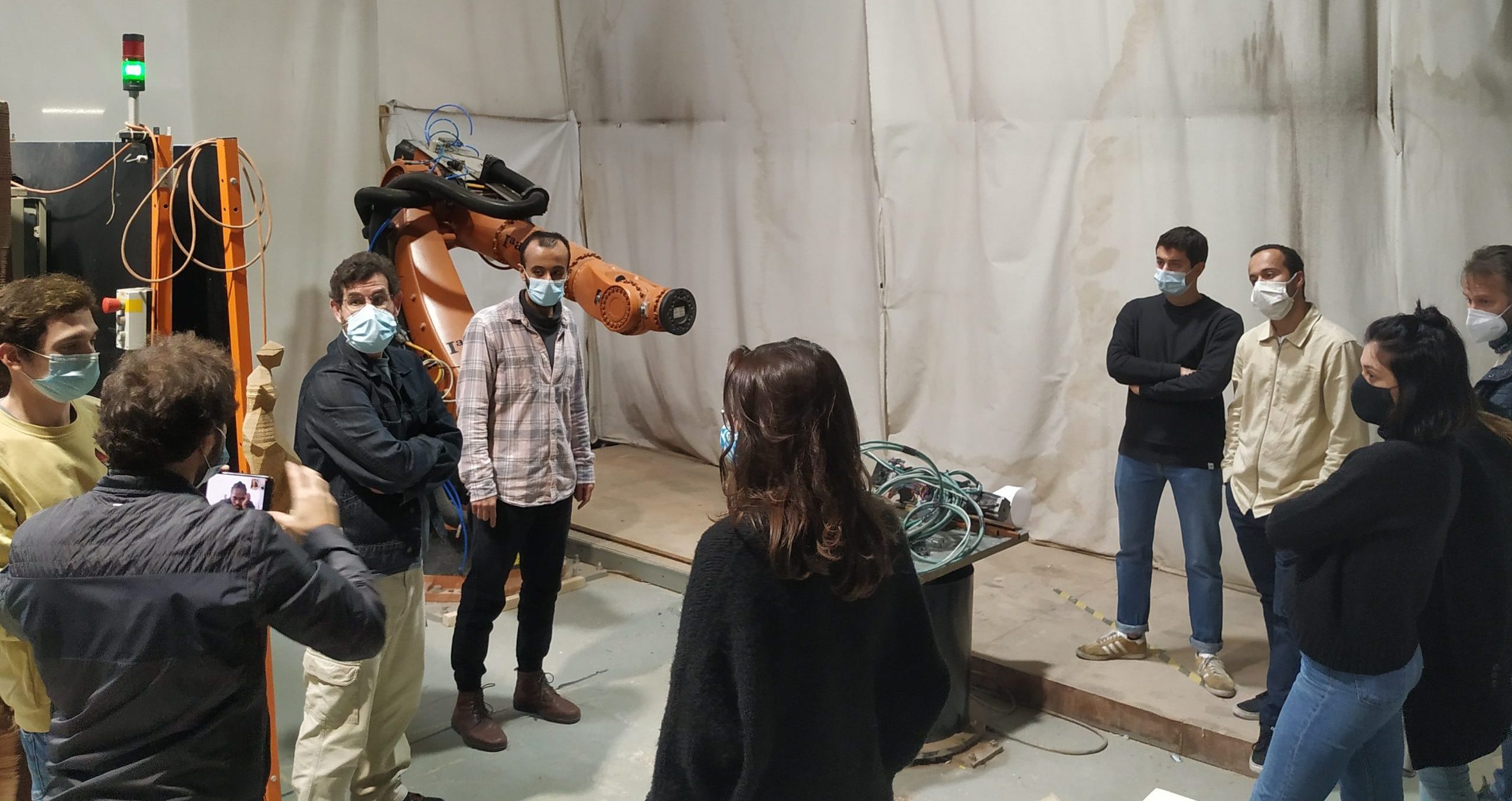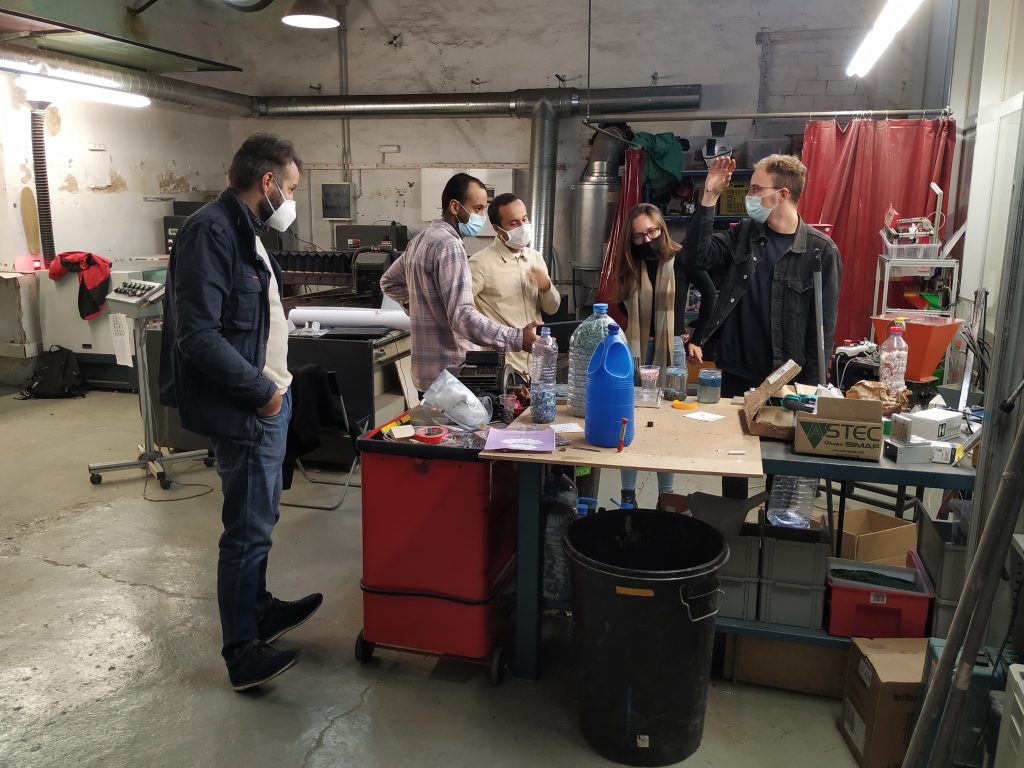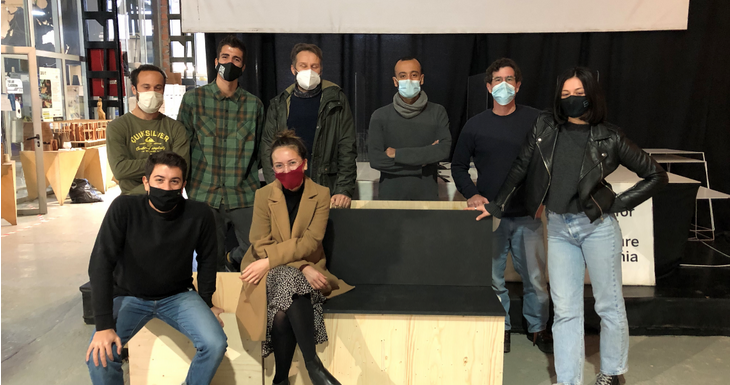
Exploring Emergent Futures; From Ideas to Reality
Bespoke educational program designed for the European Institute of Innovation & Technology (EIT) and the Universitat Politècnica de Catalunya (UPC).
Clients
European Institute of Innovation & Technology (EIT)
Universitat Politècnica de Catalunya (UPC)
Service Format
Bespoke educational program
Delivery Method
Hybrid (digital & physical) learning with remote monitoring from Fab Lab Barcelona and industry experts
Duration
32 hours of facilitation over 9 weeks
6 hybrid learning sessions
3 online mentoring sessions
Taking into consideration the interests of European Institute of Innovation & Technology (EIT) and Universitat Politècnica de Catalunya (UPC), Fab Lab Barcelona designed and deployed the program “From Ideas to Reality” as a part of a strategic collaboration to actively participate in the creation of future educational courses to be facilitated as a complement of their current EIT InnoEnergy Master’s in Energy for Smart Cities
Overview
The “From Ideas to Reality” program was facilitated as a part of the ground-breaking pilot course,”Moonshot Project”, created by a UPC team formed by Professor Andreas Sumper, EIT InnoEnergy Master School graduate Marc Jené, Maria Marín and Paula Gonzálezed.
The goal for this program was to provide the tools, skills, attitude and competences for bringing the student’s ideas into the future of digital fabrication and distributed manufacturing.
This program worked to engage participants in new creative methodologies in critical design and technology. These methodologies were to be used as tools for exploring emergent future scenarios with the aim of assisting them to find new opportunities in an effort to prototype emergent solutions.
The program empowered participants with digital literacy tools to foster their understanding of advanced technologies. It provided knowledge for the possibilities these methods offer from design to manufacturing, including associated times, risks and costs.
Main Goals
Fab Lab Barcelona’s “From Ideas to Reality” program included two main educational goals:
1) Train students how to ‘explore emergent futures’
The ‘Atlas of the Weak Signals’ methodology offers teachers and students a way to get introduced into the concept and practice of identifying “weak signals.” These ‘weak signals’ are a tool for finding possible emergent futures scenarios, scenarios which can assist in the exercise of finding opportunities, threats, challenges and shared visions for innovation, policy making, intervention, research and business opportunities in the future.
The ‘Atlas of the Weak Signals’ methodology uses a card game developed by Fab Lab Barcelona which is focused on five different global issues. EIT-UPC chose to focus their work on the weak signal category, ‘Designing for the Post-Anthropocene’
The goal for this capsule was for participants to gain a newly expanded view and understanding of the multiple possibilities for emergent futures design strategies. It also showed students how to use innovation as a tool for expanding skills and capacities at the personal and professional levels.
2) Train how to ‘prototype and iterate’
Fab Lab Barcelona is the perfect setting for allowing students to bring their ideas into reality. This capsule was a practical and intensive training program and a broad reaching introduction to the Fab Lab environment. Students were introduced to the machines of the fab lab, learned how to operate them, and were introduced to the knowledge to improve their projects by allowing them ‘Make (almost) anything’.
Project Team

Santi Fuentemilla
Future Learning Lead
Santiago Fuentemilla has a Master’s degree in Architecture from the University of La Salle (Universitat Ramon Llull), Spain. In 2012 he graduated from the Fab Academy, an intensive 6-month digital manufacturing and rapid prototyping program led by Neil Gershenfeld at MIT’s Center for Bits and Atoms (CBA). He is currently doing a PHD in digital manufacturing at the EGA UPC (Universitat Politecnica de Catalunya). As a professional architect, Santi has worked in several architecture companies carrying out projects at an international level for more than 10 years. Since 2013 he has been part of the Fab Lab Barcelona core team as coordinator and leader of the Future Learning research area. The area focuses on designing and implementing innovative educational models promoting growth, learning and creativity to generate opportunities to achieve the goals and challenges of uncertain futures. He is the director of the global academic programs Fab Academy and Fabricademy in the Barcelona node. Since 2017 he has been a professor of the Master in Design for Emergent Futures (MDEF). Santi participates in private and EU-funded research projects such as TEC-LA, which measures the impact of the introduction of maker project-based learning for the development of STEAM competences, skills and knowledge in primary school students, DO IT, on entrepreneurship and social innovation for young people, PHALABS 4. 0 which links photonics research and its practical application in the Fab Lab, POP-MACHINA which aims to demonstrate the power and potential of the maker movement and collaborative production for the circular economy of the European Union or SHEMAKES which aims to empower future innovators in the sustainable fashion industry through inspiration, skills and networking.

Mariana Quintero

Guillem Camprodon
Executive Director
Guillem Camprodon sits at the nexus of emergent technologies and bottom-up communities, serving as the Executive Director of Fab Lab Barcelona at the Institute for Advanced Architecture of Catalonia (IAAC). The lab is a leading hub in a global constellation of over 2,000 Fab Labs and is the epicentre of the Distributed Design Platform. An educator at heart, he co-directs the Master on Design for Emergent Futures (MDEF), a synergistic endeavour between IAAC and ELISAVA. Previously, he spearheaded Smart Citizen, a paradigm-shifting platform that subverts the conventional, hierarchical Smart City models by democratizing access to environmental data tools. His past tenure as a Research Lead saw him contribute to seminal European research projects, including Making Sense, iSCAPE, ROMI and Reflow.

Xavier Domínguez
Strategic Projects Lead
Xavier Domínguez is a multimedia engineer, action researcher at Fab Lab Barcelona, lecturer in the Master in Design for Emerging Futures at IAAC-Elisava and global instructor in the Fab Academy programme led by Neil Gershenfeld at MIT’s Center for Bits and Atoms (CBA). Since 2017 he has focused his entire professional career on researching methods and tools to accompany people in developing competencies and skills for life through creativity and innovative use of technology under the principles of circularity, sustainability and equity. Xavier is involved in private and EU-funded research projects such as TEC-LA, which measures the impact of introducing maker project-based learning for the development of STEAM competences, skills and knowledge in primary school students, DO IT, on entrepreneurship and social innovation for young people, PHALABS 4.0 which links photonics research and its practical application in the Fab Lab, POP-MACHINA which aims to demonstrate the power and potential of the maker movement and collaborative production for the circular economy of the European Union or SHEMAKES which aims to empower future innovators of the sustainable fashion industry through inspiration, skills and networking.

Víctor Barberán Soler
Hardware and Software Expert
Víctor Barberán is an Industrial Designer with more than 20 years of experience developing custom technology for multidisciplinary art and science projects. Throughout his career, Victor Barberán has worked in electronics design, software development, data analysis, modelling and animation, and digital postproduction. Currently, Victor works as part of the Fab Lab Barcelona as a software and hardware developer in multiple research projects, such as the Smart Citizen project. He is also the Electronics lead for the Fabricademy, Fab Academy and the Masters of Design for Emergent Futures program.

Mikel Llobera Guelbenzu
Laboratory Manager

Eduardo Chamorro Martin
Additive Manufacturing Expert
Eduardo Chamorro is an architect and researcher who works to discover how technology can transform architecture and its processes to improve people’s lives. He is currently a PhD candidate at Swinburne University (Melbourne, Australia) in High performance composites additive manufacturing for architecture. As a digital fabrication expert, he is faculty in the Master for Advanced Architecture (MAA), Master in Advanced Ecological Buildings (MAEB), 3D Printing in Architecture (3DPA), Master in Design for Emergent Futures (MDEF), FabAcademy at IAAC FabLab Barcelona. For him, working in a multi-scalar environment must be the priority of an architect nowadays. He holds a Master’s Degree in Architecture from CEU San Pablo University (Spain), a Fab Academy diploma in Digital Fabrication offered by the Fab Lab Network and a Master’s Degree in Advanced Architecture from IAAC (Spain), with a specialisation in digital fabrication, materiality and new design methodologies. He holds as well a Spanish architectural licence. Moreover, he has worked as Fab Lab Seoul director (South Korea) and researcher in several architecture studios, computational design and fabrication professor at CEU University, advisor as a fabrication expert for different architecture collectives, and is a usual collaborator in Fab Lab Madrid. He is always seeking innovative architecture to solve and adapt to social needs.
Want to receive new projects in your inbox?
Leave your email address
Contact for Business Opportunities



